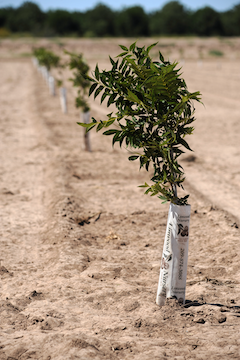For more details about an impact, contact information for NMSU ACES faculty and staff is available at the online directory.
For general questions regarding impacts in this database, please contact Claire Montoya at ccortner@nmsu.edu.

Deficit watering on pecan pollen viability
Pecans are a large contributor to New Mexico’s agricultural economy with production exceeding $130 million annually. An important horticultural constraint for profitable pecan production in NM is water availability. As water is a limited valuable resource, NMSU researchers evaluated the impact of deficit irrigation on pecan tree pollen. Findings revealed that 'Pawnee' trees experiencing water deficit produced less viable pollen compared to 'Pawnee' pollen from adequately watered trees. Additionally, morphology differences were observed in pollen tube formation, with as a slight reduction in pollen tube length observed in the water deficit samples. Even a year after the trees were provided with full water, the impact on pollen viability persisted. Gene expression analyses in germinated pollen showed notable differences between pecan trees subjected to full watering and water deficit.